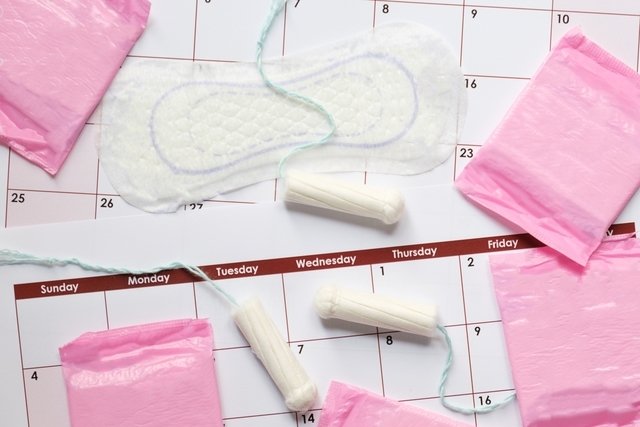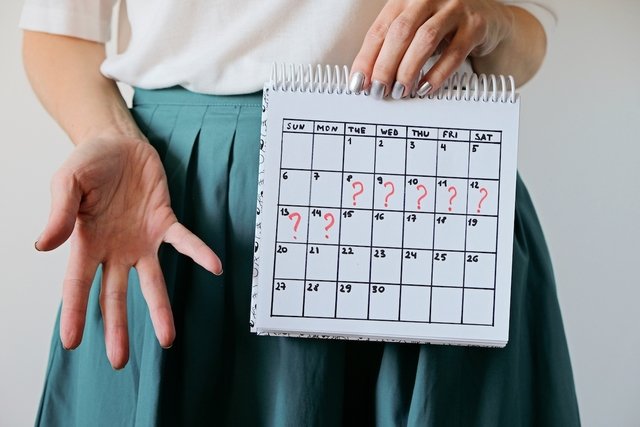Menstruation is the loss of blood through the vagina over a period that lasts between 3 and 8 days. Menstrual bleeding is normal and is part of a woman’s menstrual cycle, occurring due to the desquamation of the walls of the uterus, which flake off when a pregnancy has not occurred.
The first menstruation occurs during puberty, around 12 years of age, although it can vary from girl to girl. After that, it should appear every month until menopause, which occurs around the age of 50.
During pregnancy, menstruation does not occur, however the woman may have a small amount of bleeding for 1 or 2 days, especially at the beginning of pregnancy, pink or brown in color, like coffee grounds. Find out what can cause menstruation during pregnancy.

How to know if your period is approaching
When menstruation is approaching, a woman may present some signs and symptoms, the main ones being:
- More swollen and painful breasts;
- Abdominal swelling;
- Mood variations;
- Tiredness;
- Headache;
- Cramps;
- Increased appetite.
Furthermore, some women may have diarrhea before and during menstruation, as during this period there is an increased release of prostaglandins, which are substances responsible for muscle contractions, which can affect the intestine, resulting in increased bowel movement and causing diarrhea. Check out other signs that indicate your period is approaching.
Calculate your next period
To find out the date of your next period, enter your details into the calculator below:
When does the first menstruation occur?
The first menstruation, also known as menarche, varies from girl to girl due to hormonal changes in each body, however, it is more common to happen around 12 years of age. However, some girls may have their first period between the ages of 13 and 15 or earlier, between the ages of 9 and 10. Find out more about your first period.
How long does it last
The duration of menstruation also varies from one woman to another, but the most common is that it lasts between 3 and 8 days. Generally, the next menstruation appears around the 28th day after the first day of the previous menstruation, but this period may vary according to the woman’s menstrual cycle.
It is important to consider the 1st day of menstruation when a small amount of bleeding appears, even if it is pink and in small quantities. Some girls have this type of flow for 2 or 3 days, and from then on, menstruation becomes more intense. Understand better how the menstrual cycle works.
Main changes in menstruation
Menstruation may have some changes due to female hormone levels circulating in the body, an increase in the amount of circulating testosterone, changes in the thyroid, stress, pregnancy or changes in the ovary or uterus, for example. Some of the main changes related to menstruation are:
- Delay in menstruation, which may be a consequence of changing or stopping the use of continuous contraceptives or being related to a very restricted diet, very intense and excessive physical activity, for example;
- Dark menstruation, which is normally related to hormonal changes, and may also be influenced by the woman’s stress levels, sexually transmitted infection or be a sign of endometriosis;
- Lack of menstruation, which may be associated with pregnancy, stress, eating disorders or thyroid changes, for example;
- Irregular menstruationwhich is more common to occur at the beginning and end of reproductive life, and can also occur as a consequence of changing contraceptives, hormonal variations;
- Menstruation with clotswhich is usually normal and is usually indicative of hormonal changes, however it can also be a sign of diseases such as myoma and endometriosis.
In the presence of changes in menstruation, it is important that the gynecologist is consulted so that tests can be carried out to identify the cause of the change, and then initiate the most appropriate treatment. Find out about other changes in menstruation.
Common questions about menstruation
Below, we clarify the main doubts about menstruation:
1. What color is a normal period?
The color of menstruation changes over the days of menstruation, ranging from bright red to light brown. However, there are also times when women experience darker periods, like coffee grounds, or lighter periods, without this indicating any health problem.
In most cases, changes in the color of menstruation are related to the time that the blood is in contact with the air. Thus, a period that has been on the pad for longer is generally darker.
2. Is it possible to get pregnant while menstruating?
Although difficult, it is possible to get pregnant by having intimate contact while menstruating. This happens because hormone production can vary in each woman, and ovulation can occur even during the menstrual period.
3. Is a late period always a sign of pregnancy?
Changes in the date when menstruation appears are usually caused by changes in a woman’s hormonal levels. Therefore, a delay in menstruation is not always a sign of pregnancy, and may indicate other situations such as excess stress, excessive coffee consumption or changes in hormone-producing organs, such as the pituitary gland, hypothalamus or ovaries. If your period is more than 10 days late, you should take a pregnancy test or go to the gynecologist.
4. Do women who live in close proximity menstruate at the same time?
As hormone production depends on routine factors such as diet and stress, women who spend a lot of time together tend to experience the same external factors that influence the menstrual cycle, which ends up causing hormone production and the timing of menstruation to be similar between each other. they.
5. Do all women have PMS?
PMS, or Pre-Menstrual Tension, is a set of symptoms that appear in women approximately 1 to 2 weeks before menstruation. Although it is very common, PMS only occurs in around 80% of women and therefore does not affect all women who menstruate.
6. Can very heavy menstrual flow cause anemia?
In general, heavy flow is not a reason to suffer from anemia, as it normally only appears when menstrual losses are really high, which only happens when there are diseases causing the problem, such as uterine fibroids and ectopic pregnancy. Therefore, a woman should only be concerned when her period lasts more than 7 days, if her menstrual cycle is shorter than 21 days, or if she uses more than 15 pads in each menstrual period. See the causes and treatment for prolonged menstruation.
7. Does your period stop in the pool or in the sea?
When a woman enters the pool or the sea, menstruation continues to occur, however, the presence of water in the intimate area reduces body temperature and also causes an increase in pressure, which can make it difficult for blood to escape. However, after leaving the water it is possible that menstruation will come quickly, simply because it has been accumulating inside the vaginal canal.

Sign up for our newsletter and stay up to date with exclusive news
that can transform your routine!
Warning: Undefined array key "title" in /home/storelat/public_html/wp-content/plugins/link-whisper-premium/templates/frontend/related-posts.php on line 12
Warning: Undefined array key "title_tag" in /home/storelat/public_html/wp-content/plugins/link-whisper-premium/templates/frontend/related-posts.php on line 13




